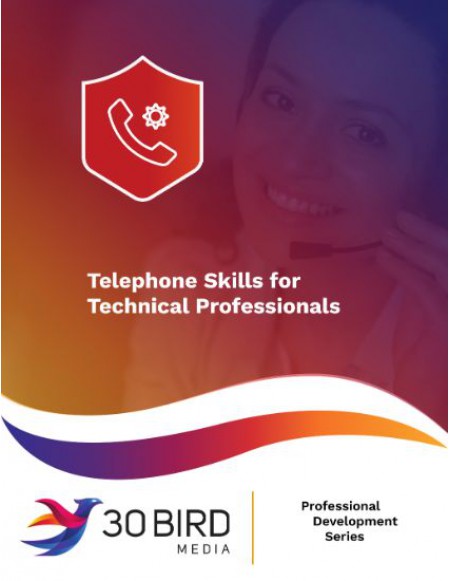Introduction
Course topics
Module 1: Overview
Understanding customer service
The challenges of help desk technical support
The importance of identifying your own attitudes about customer service
Understanding your customer
Customer expectations
Understanding and appreciating your customer from their perspective
The difference between being accountable and being responsible
What signals are you sending?
Activity: Can you hear a smile?
Module 2: Identifying and improving your communication style
About communication
It’s how you say it
Identifying communication styles
Activity: Identify a colleague's primary communication style
Communication differences between technical and non-technical professionals
Real-world examples
Activity: Logic and emotion
Differentiating person style preferences
Relating to the non-technical customer
Activity: Analogies/metaphors
Active listening
Seven reasons for active listening
Blocks to listening
Becoming a better listener
Empathy and interactions with customers
Generating empathy
Using empathy statements: Summary and examples
Module 3: Managing customer expectations over the phone
Understanding customer expectations
About customer expectations
Managing and delivering against customer expectations
Making sense of words
Simplifying the message
Clarifying the complicated
Module 4: Opening and closing the call
Setting the proper tone
Tip: Seven steps to a successful call
Tip: Paraphrasing
Using questions to diagnose technical issues
Troubleshooting
Activity: Listing troubleshooting questions by category
Closing the call
Module 5: Keeping customers informed
The importance of keeping your customer informed
Tip: Plan of attack
Putting the customer on hold
Transferring the call
Activity: Using positive language
Delivering solutions diplomatically
Creative problem solving
Tip: Delivering bad news
Module 6: Special circumstances—dealing with angry and impatient customers
Dealing with a difficult situation
Activity: Responding to a difficult customer
Tips: Dealing with anger/impatience
Managing the out-of-control customer
Benefits of effective phone communication
Benefits of customer-centrism
Course Summary
As a help desk professional providing technical support, you need to interact with customers to address their technical issues, concerns, challenges and problems. In order to best service these customers, the 30 Bird Telephone Skills for Help Desk Professionals course will help develop interpersonal skills that will enable you to do so in a professional manner. Your technical expertise will no doubt be useful; however, having additional "people" skills will enable you to appropriately interact and serve the customer.
In this workshop, you will be able to apply practical skills and principles to over-the-phone customer service for customers experiencing technical issues.
Upon the successful completion of this course, candidates can expect to gain knowledge and understanding in the following areas:
- About the challenges of help desk technical support, the importance of identifying your own attitudes about customer service, how to understand and appreciate the customer's perspective, about customer expectations for interaction, the difference between being accountable and being responsible, and to identify any unhelpful signals that you might be sending
- How to identify your default communication style, communication differences between technical and non-technical professionals, from real-world examples, to identify and work with logic and emotion, to differentiate personal style preferences, to relate to the non-technical customer, how to actively listen to customers, seven ways to better listening, and how to employ empathy in your interaction with customers
- About customer expectations, how to clarify complicated descriptions of problems and the importance of doing so, and how to focus on results
- How to open the call by setting the proper tone, seven steps to a successful call, to use paraphrasing as a tool, to use questions to diagnose technical issues, the appropriate protocol for troubleshooting technical issues, and how to close the call
- Tips for keeping customers informed, an effective procedure for putting customer on hold and transferring calls, how to use positive language when relating to the customer, how to deliver solutions diplomatically—good news and bad news, and creative problem solving
- Tips for dealing with angry and/or impatience, and specific steps to take when doing so; how to deal with anger or impatience; and the benefits of effective phone communication and customer-centrism
This workshop helps candidates understand and learn the skills and techniques to achieve successful customer interaction. It covers some of the same topics as the 30 Bird Customer Service for Help Desk Professionals course, but it focuses more specifically on the telephone skills required to interact with customers effectively.
About the series
Professional skills—such as the ability to manage work schedules and communicate effectively with customers—are personal and interpersonal proficiencies that don’t depend on technical knowledge but are crucial for successful and efficient functioning of any organization. 30 Bird Media is thrilled to announce our brand new line of engaging, relevant, and straight-to-the-point professional development courseware. From the very start we knew it was important not to simply force this new and different content into our existing IT-specific format. Each professional development course comprises an Instructor Guide, a PowerPoint slide deck highlighting important points, and a Student Guide. Taken together, these training tools empower you to teach these concepts effectively in any classroom or workshop setting.
For more information and access to the PowerPoint files, please contact your 30 Bird sales representative or call (888) 330-9071.
To request the PowerPoints for this course, please e-mail sales@30bird.com.

